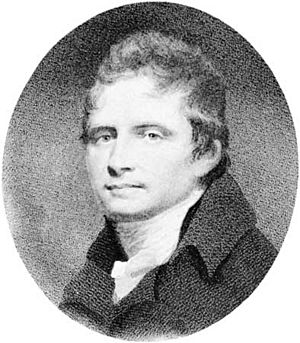Thomas Brown (philosopher) facts for kids
Quick facts for kids
Thomas Brown
|
|
|---|---|
 |
|
| Born | 9 January 1778 Kirkmabreck, Kirkcudbrightshire, Scotland
|
| Died | 2 April 1820 (aged 42) Brompton, London, England
|
| Nationality | Scottish |
| Alma mater | The University of Edinburgh |
| Occupation | Philosopher, poet |
| Organization | The University of Edinburgh |
Thomas Brown FRSE (9 January 1778 – 2 April 1820) was a Scottish philosopher and poet. He is remembered for his deep thinking about how our minds work and for his poetry.
His Life Story
Early Years
Thomas Brown was born in Kirkmabreck, Scotland, in 1778. His father was a minister. From a young age, Thomas loved to read and learn. He went to different schools in London. In 1792, he started studying at the University of Edinburgh. There, he took a class on moral philosophy.
Thomas first studied law, then switched to medicine. His medical paper, De Somno (which means "About Sleep"), was well-received. But his real talent was in understanding how the mind works.
His Career
In 1806, Brown became a doctor in Edinburgh. Even though he was good at it, he preferred writing and philosophy. He wanted to become a professor at the university.
In 1808, a professor named Dugald Stewart became ill. Thomas Brown was asked to teach his classes. The students really liked him. They enjoyed his excellent speaking skills and his new ideas. In 1810, he officially became a colleague to Professor Stewart. He held this job for the rest of his life.
Thomas Brown worked very hard. He wrote his lectures quickly and spent a lot of time preparing his many poems for publishing. He was also writing a summary of his lectures for his students. All this hard work made him very tired. His health, which was never very strong, got worse. He was advised to travel to London for his health. Sadly, he died there in 1820, when he was only 42 years old. His body was brought back to Kirkmabreck for burial.
His Ideas
Thoughts on Erasmus Darwin
One of Thomas Brown's important works was a book called Observations on the Zoonomia of Erasmus Darwin (1798). In this book, he wrote about his disagreements with some of Erasmus Darwin's ideas. Erasmus Darwin was a famous scientist and the grandfather of Charles Darwin.
Erasmus Darwin had a theory about how living things change over time. He suggested that animals might get new body parts, like tusks or wings, just by wishing for them. He also thought that living things could create new matter.
Thomas Brown disagreed with these ideas. He wrote that animals cannot simply wish for new body parts and make them appear. He also argued that living things do not create new matter. Instead, they use matter that already exists. For example, he said that a shell grows by using materials that are already in the water, not by creating new material. Brown believed that if animals could just wish for things, humans would have grown wings by now! He pointed out that animals haven't changed their shapes much since people started studying them.
Brown's criticism was not based on religion. It was about how we understand the world and how things truly work. His ideas were similar to those of Thomas Robert Malthus, another thinker who wrote about population.
See also
- Associationism
- James Braid (surgeon)
 | Sharif Bey |
 | Hale Woodruff |
 | Richmond Barthé |
 | Purvis Young |

